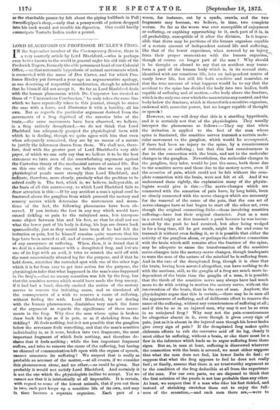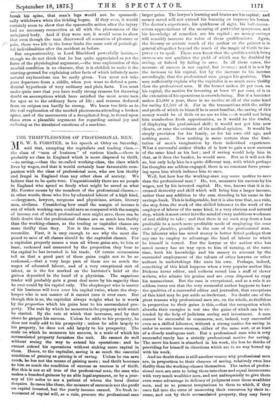a very masterly article by Lord Blachford,—who is perhaps even
better known to the world in general unfler his old title of Sir Frederick Rogers, formerly the able permanent head of our Colonial Office,—on that automatic hypothesis of animal movements which is connected with the name of Des Cartes, and for which Pro- fessor Huxley put forward a year ago an argumentative apology, as one deserving of respectful consideration, though he admitted that he himself did not accept it. So far as Lord Blachford deals with the human phenomena which Dr. Carpenter has treated as those of" Unconscious Cerebration," he only takes the same line which we have repeatedly taken in this journal, though he states the case with a force, and illustrates it with a lucidity, all his own. But as regards the particular argument derived from the Movements of a frog deprived of the anterior lobe of the brain,---the same movements have been observed, we believe, in a frog entirely decapitated,—we do not think that Lord Inachford has adequately grasped the physiological facts with which he is dealing, though we quite agree with him that even When adequately conceived, they are by no means of a nature to justify the inferences drawn from them. We shall not, there- fere, deal with the greater part of Lord Blachford's very able paper, of which we can only say that we believe it to be the best statement we have seen of the overwhelming argument against the Cartesian theory of the mechanical nature of animal life. But on this one side of the case, we believe that we can put the physiological puzzle more strongly than Lord Blachford, and indicate, therefore, more clearly, precisely what the problem to be solved really is. The fact, which is, we believe, indisputable, at the basis of all this controversy, to which Lord Blachford fails to draw attention is this :—If by any accident a man's spinal cord be fractured above the ganglion from which proceed the motory and sensory nerves which determine the movements and sensa- tions of the feet, the following phenomena have been ob- served. If you irritate the feet in any way which would have caused tickling or pain to the uninjured man, but interpose some object between him and his feet, so that he shall not see what the lower part of his body is doing, his legs are drawn back Spasmodically, just as they would have been if he had felt the irritation or pain, but he himself remains quite unaware that his legs have been moved at all, and of course, perfectly unconscious of any annoyance or suffering. When, then, it is found that if we deal in a similar manner with a decapitated frog, and irritate one of its legs with an acid, it tries to scratch the acid off with the most conveniently situated leg for the purpose, and if that be held down, scratches the corroded spot with one of the other legs which it is far from easy to get into action for the purpose, the physiologists infer that what happened in the man's case happened in the frog's,—that no uneasy sensation was felt by the frog, but that the sensitive nerves which would have made the frog uneasy, if it had had a head, directly excited the action of the motory nerves to remove the irritating cause, and so simulated all the consequences of a wish to remove a cause of suffering, without feeling the wish. Lord Blachford, by not dealing with the human phenomenon, diminishes very much the force Of the argnment as regards the significance of these move- ments in the frog. Why does the man whose spine is broken draw back his legs as if in pain, or as if shrinking from the tickling? He feels nothing, but is it not possible that the ganglion -below the severance feels something, and that the man's sensitive individuality is, as it were, broken into two fragments, the most important fragment of which feels nothing, and therefore de- blares that it feels nothing ; while the less important fragment nwffers, and fries to remove the cause of the suffering, but having no channel of communication left open with the organs of speech, cannot announce its suffering? We suspect that is really as probable an account of the matter,—at all events, if we consider this phenomenon alone, and no other,—as could be given. But probably it would not satisfy Lord Blachford. And certainly it is not the one which the physiologists incline to accept. Yet we cannot see that it is intrinsically at all impossible. It is certain, with regard to some of the lowest animals, that if you cut them in two, each part keeps up a sensitive life of its own, and may in. time become a separate organism. Each part of a
worm, for instance, out by a spade, crawls, and the two fragments may become, we believe, in time, two complete worms. So far as the worm was ever susceptible of enjoyment or suffering, or anything approaching to it, each part of it is, in all probability, susceptible of it after the division. Is it impos- sible that there may be portions of the human organism capable of a certain amount of independent animal life and suffering, like that of the lower organisms, when severed by an injurk from their proper connections with the human organism, \ though of course no longer part of the man ? Why should it be thought so absurd to say that an accident may trans- form a part of the human body which is, in its normal state, identified with our conscious life, into an independent centre of vastly lower life, but still life both sensitive and muscular, so that the true account of what happens would be to say that the accident to the spine has divided the body into two bodies, both capable of suffering and of motion,—the body above the fracture, which is the only one over which the man retains any control, and the body below the fracture, which is thenceforth a sensitive organism, endowed with muscular power, but no longer capable of thought or speeck ?
However, no one will deny that this is a startling hypothesis, and it is certainly not that of the physiologists. 'limy usually interpret the phenomena as follows :—They say that when the irritation is applied to the feet of the man whose spine is fractured, the sensitive nerves transmit a certain mole- cular movement to the ganglion, which would be accompanied, if there had been no injury to the spine, by a consciousness of irritation or suffering ; but that this last consciousness is due to the connection with the brain, and not to the molecular changes in the ganglion. Nevertheless, the molecular changes in the ganglion, they infer, would be just the same, both those due to the sensitive nerve and those due to the motory nerve, even if the sensation of pain, which could not be felt without the com- plete connection with the brain, were not felt at all. And if we understand them rightly, the explanation many of the physio- logists would give is this :—The nerve-changes which are connected with the sensation of pain have, by long habit, been so closely connected with the nerve-changes which are necessary for the removal of the cause of the pain, that the one set of nerve-changes have at last begun to start off the other set, even though the original connecting-links—those involving sensitive suffering—have lost their original character. Just as a man in a crowd might at first transmit a push because he was incom- moded by the push he had received, but after being wedged in for a long time, till he got numb, might in the end come to transmit it without even feeling it, so it is possible that either the activity of the ganglion alone, or perhaps the defective connection with the brain which still remains after the fracture of the spine, may be adequate to cause the transformation of the sensitive nerve-changes into the motory-nerve changes, though inadequate to warn the man of the natureof the mischief he is suffering from. And in the case of the decapitated frog, though it is clear that the brain, having been severed altogether, can have nothing to do with the motions, still, as the ganglia of a frog are much more in- dependent of the brain than the ganglia of a man, it is possible that the throb of the sensitive nerve may always have had much more to do with setting in motion the motory nerve, without the intervention of the brain, than in the case of man. Anyhow, the physiologists argue that this is certain,—there may be in man all the appearance of suffering, and of deliberate effort to remove the cause of the suffering, without any consciousness of suffering at all ; and if this be so in an injured man, why may it not be so even in an uninjured frog ? Why may not the pain-consciousness be altogether absent in it, even though it gives every sign of pain, just as it is absent in the injured man though his lower limbs give every sign of pain? If the decapitated frog makes quite elaborate efforts to rub the corrosive acid off its leg, clearly it must either be suffering, without a brain, or else there must be a flaw in the inference which leads us to argue suffering from these signs. But as, in man at least, suffering is disavowed wherever the connection with the brain is severed, we must either suppose that what the man does not feel, his lower limbs do feel; or suppose that what the frog appears to feel he does not really feel ; or finally, assume that there is no trustworthy argument as to the condition of the frog deducible at all from the experience of the man. For our own parts, we are disposed to think that the first solution of the puzzle is not less probable than any other. At least, we suspect that if a man who likes his feet tickled, and instead of shrinking stretches them out to enjoy the full- ness of the sensation,—and suck men there are,—were to break his spine, that man's legs would not be spasmodi- cally withdrawn when the tickling began. If they were, it would certainly seem to show that the spasmodic action after the injury had no necessary connection at all with the phenomena of the uninjured body. And if they were not, it would seem to show that even though the man disavowed all sensation of pleasure or /4"' pain, there was left in the lower limbs the same sort of pathologi- cal individualities after the accident as before.
But unquestionably, as Lord Blachford powerfully insists,— though we do not think that he has quite appreciated as yet the force of the physiological argument,—the true explanation of this morbid condition is so obscure, that it is childish to make it the starting-ground for explaining other facts of which infinitely more natural explanations can be easily given. You must not take your departure from a riddle, when you want to defend a para- doxical hypothesis of very ordinary and plain facts. Yon must make quite sure that you have really strong reasons for throwing doubt on assumptions which have satisfied the most acute men for ages as to the ordinary facts of life ; and reasons deduced from an enigma can hardly be strong. We know too little as to the real explanation of the morbid phenomena attending a broken spine, and of the movements of a decapitated frog, to found upon them even a plausible argument for regarding animal joy and suffering as the simulated emotions of a machine.































 Previous page
Previous page